Understanding the Family Strengths Framework in Healthcare Settings
VerifiedAdded on 2022/10/04
|5
|1015
|19
Report
AI Summary
This report provides an in-depth analysis of the Family Strengths Framework and its application within healthcare settings, with a specific focus on its relevance to nursing practice. The introduction highlights the increasing importance of understanding family dynamics in promoting patient well-being, particularly in the face of societal changes and health challenges. The discussion section elaborates on the framework's core principles, including caring, commitment, communication, and the ability to cope with crises. It emphasizes the role of nurses in identifying and leveraging these strengths to enhance the quality of care, improve patient outcomes, and strengthen family relationships. The report also examines how the framework can be used to support families experiencing psychological crisis and promote resilience. The conclusion reinforces the practical application of the framework by nurses, including offering feedback, providing information, and connecting families with resources. References from the report are also included.
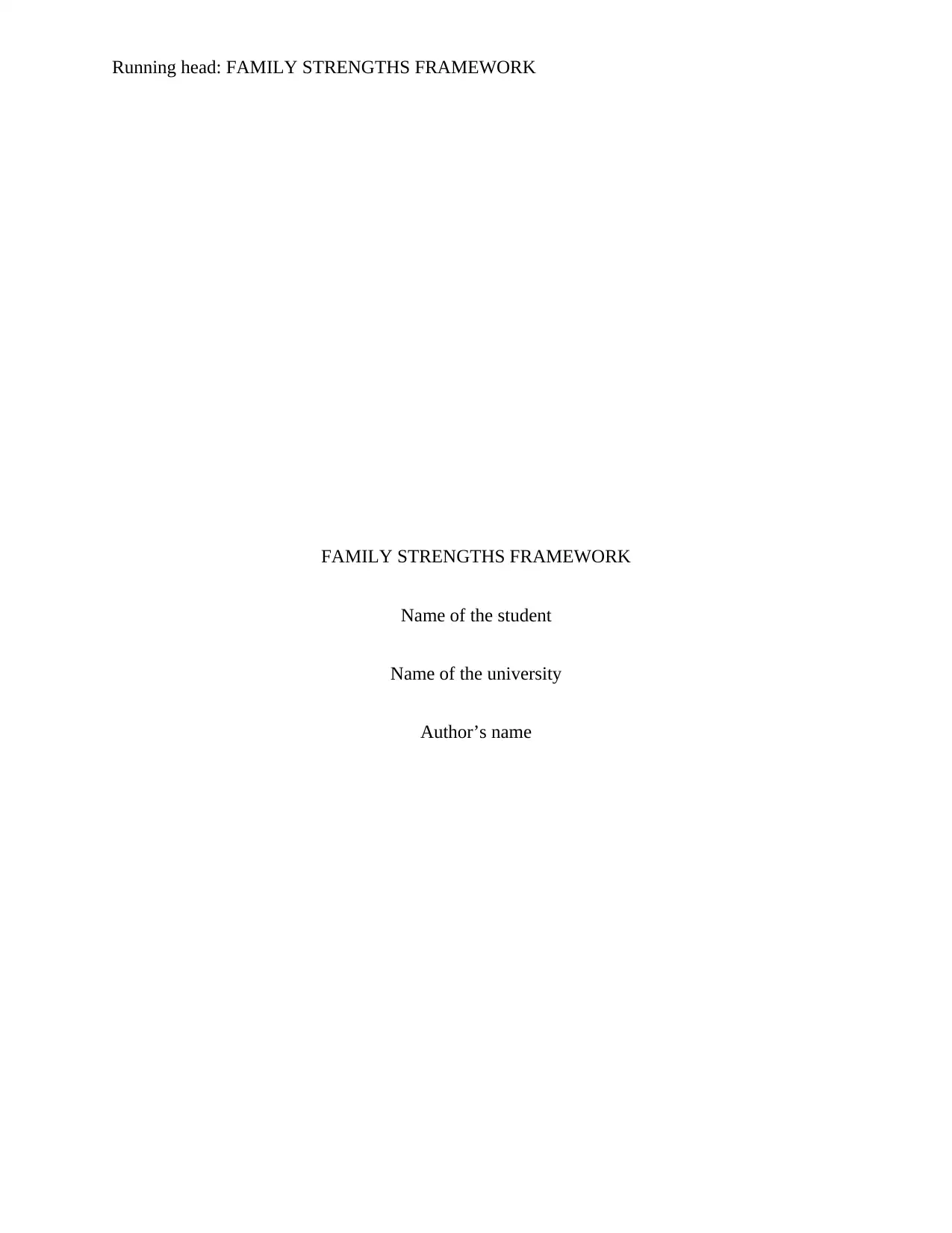
Running head: FAMILY STRENGTHS FRAMEWORK
FAMILY STRENGTHS FRAMEWORK
Name of the student
Name of the university
Author’s name
FAMILY STRENGTHS FRAMEWORK
Name of the student
Name of the university
Author’s name
Paraphrase This Document
Need a fresh take? Get an instant paraphrase of this document with our AI Paraphraser
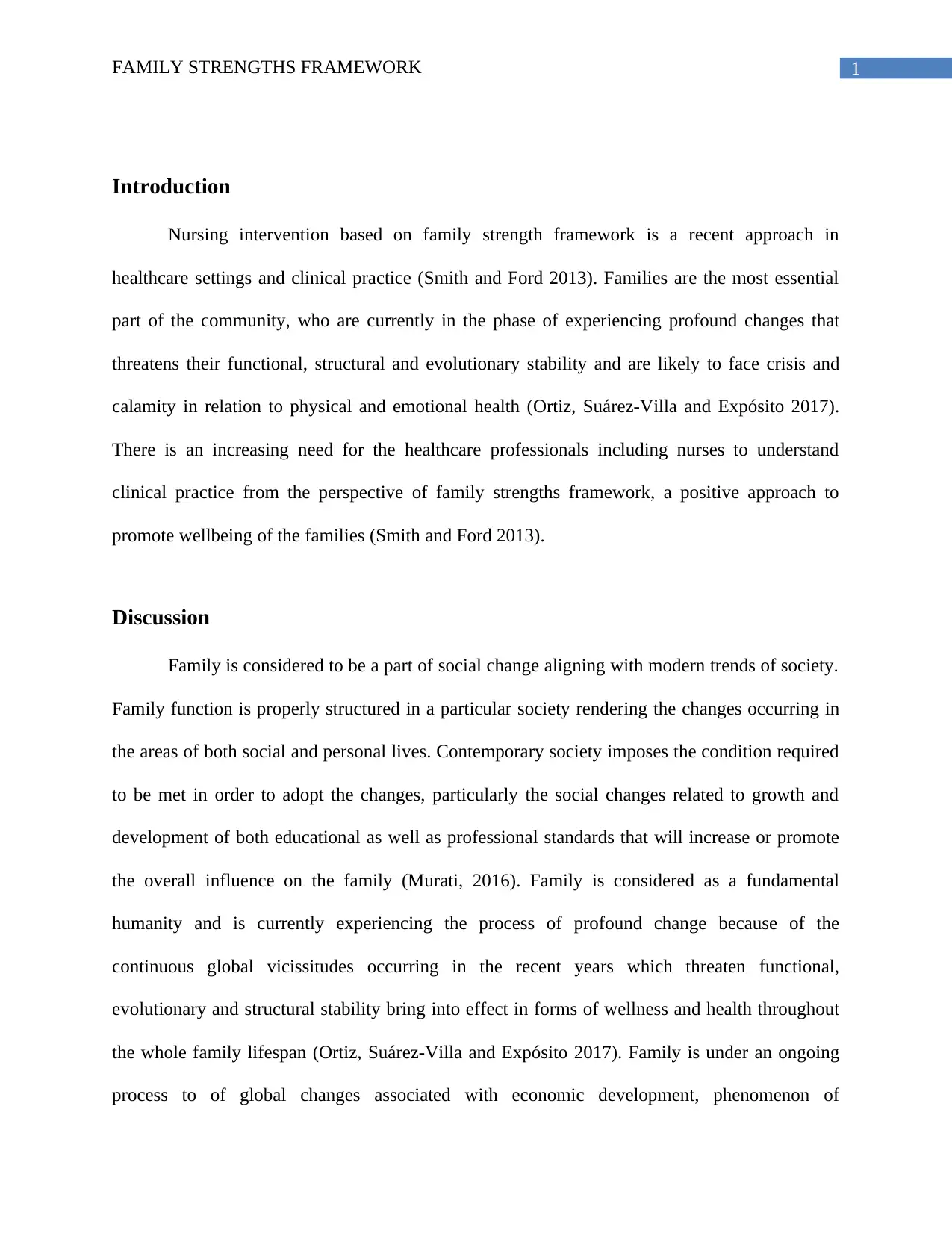
1FAMILY STRENGTHS FRAMEWORK
Introduction
Nursing intervention based on family strength framework is a recent approach in
healthcare settings and clinical practice (Smith and Ford 2013). Families are the most essential
part of the community, who are currently in the phase of experiencing profound changes that
threatens their functional, structural and evolutionary stability and are likely to face crisis and
calamity in relation to physical and emotional health (Ortiz, Suárez-Villa and Expósito 2017).
There is an increasing need for the healthcare professionals including nurses to understand
clinical practice from the perspective of family strengths framework, a positive approach to
promote wellbeing of the families (Smith and Ford 2013).
Discussion
Family is considered to be a part of social change aligning with modern trends of society.
Family function is properly structured in a particular society rendering the changes occurring in
the areas of both social and personal lives. Contemporary society imposes the condition required
to be met in order to adopt the changes, particularly the social changes related to growth and
development of both educational as well as professional standards that will increase or promote
the overall influence on the family (Murati, 2016). Family is considered as a fundamental
humanity and is currently experiencing the process of profound change because of the
continuous global vicissitudes occurring in the recent years which threaten functional,
evolutionary and structural stability bring into effect in forms of wellness and health throughout
the whole family lifespan (Ortiz, Suárez-Villa and Expósito 2017). Family is under an ongoing
process to of global changes associated with economic development, phenomenon of
Introduction
Nursing intervention based on family strength framework is a recent approach in
healthcare settings and clinical practice (Smith and Ford 2013). Families are the most essential
part of the community, who are currently in the phase of experiencing profound changes that
threatens their functional, structural and evolutionary stability and are likely to face crisis and
calamity in relation to physical and emotional health (Ortiz, Suárez-Villa and Expósito 2017).
There is an increasing need for the healthcare professionals including nurses to understand
clinical practice from the perspective of family strengths framework, a positive approach to
promote wellbeing of the families (Smith and Ford 2013).
Discussion
Family is considered to be a part of social change aligning with modern trends of society.
Family function is properly structured in a particular society rendering the changes occurring in
the areas of both social and personal lives. Contemporary society imposes the condition required
to be met in order to adopt the changes, particularly the social changes related to growth and
development of both educational as well as professional standards that will increase or promote
the overall influence on the family (Murati, 2016). Family is considered as a fundamental
humanity and is currently experiencing the process of profound change because of the
continuous global vicissitudes occurring in the recent years which threaten functional,
evolutionary and structural stability bring into effect in forms of wellness and health throughout
the whole family lifespan (Ortiz, Suárez-Villa and Expósito 2017). Family is under an ongoing
process to of global changes associated with economic development, phenomenon of
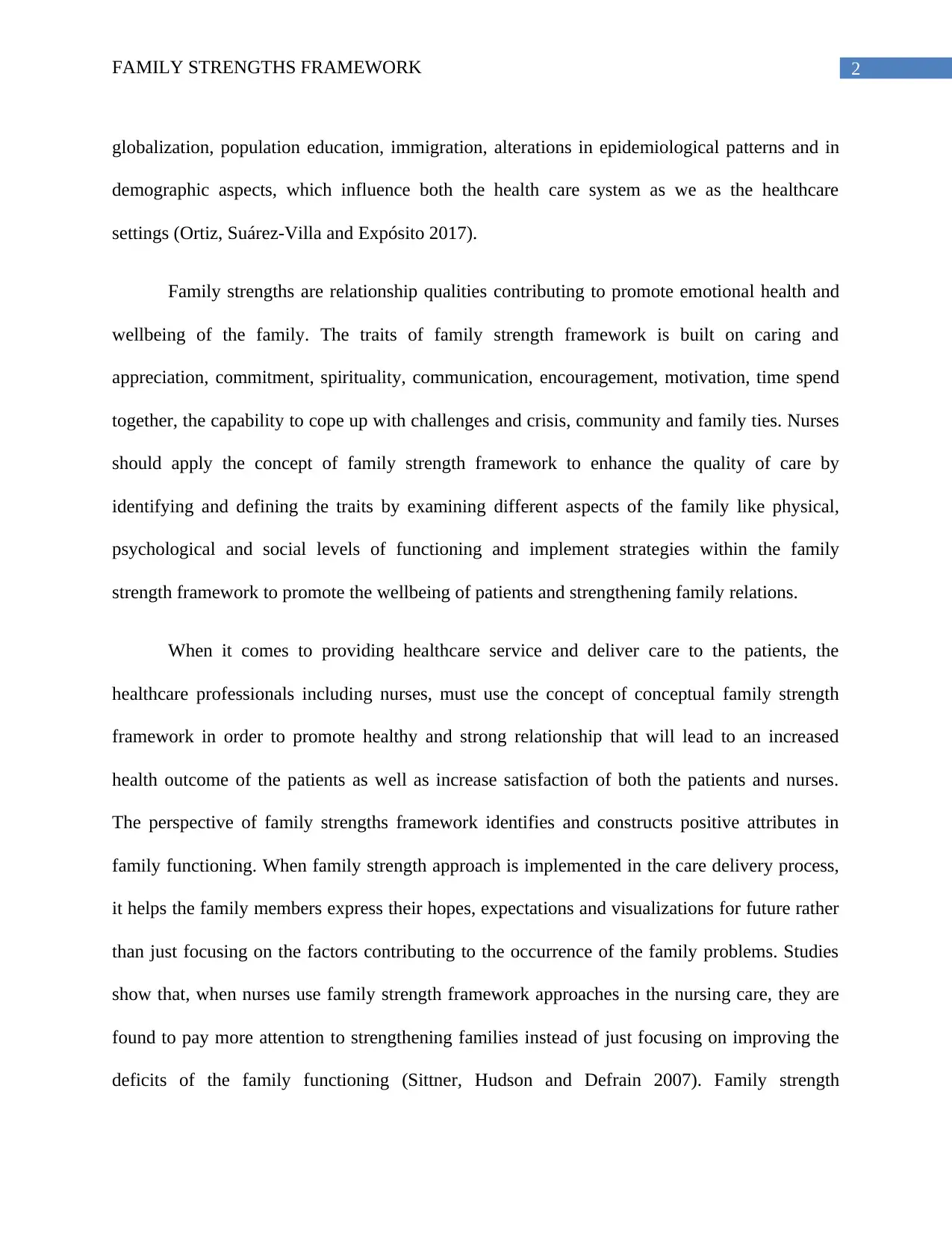
2FAMILY STRENGTHS FRAMEWORK
globalization, population education, immigration, alterations in epidemiological patterns and in
demographic aspects, which influence both the health care system as we as the healthcare
settings (Ortiz, Suárez-Villa and Expósito 2017).
Family strengths are relationship qualities contributing to promote emotional health and
wellbeing of the family. The traits of family strength framework is built on caring and
appreciation, commitment, spirituality, communication, encouragement, motivation, time spend
together, the capability to cope up with challenges and crisis, community and family ties. Nurses
should apply the concept of family strength framework to enhance the quality of care by
identifying and defining the traits by examining different aspects of the family like physical,
psychological and social levels of functioning and implement strategies within the family
strength framework to promote the wellbeing of patients and strengthening family relations.
When it comes to providing healthcare service and deliver care to the patients, the
healthcare professionals including nurses, must use the concept of conceptual family strength
framework in order to promote healthy and strong relationship that will lead to an increased
health outcome of the patients as well as increase satisfaction of both the patients and nurses.
The perspective of family strengths framework identifies and constructs positive attributes in
family functioning. When family strength approach is implemented in the care delivery process,
it helps the family members express their hopes, expectations and visualizations for future rather
than just focusing on the factors contributing to the occurrence of the family problems. Studies
show that, when nurses use family strength framework approaches in the nursing care, they are
found to pay more attention to strengthening families instead of just focusing on improving the
deficits of the family functioning (Sittner, Hudson and Defrain 2007). Family strength
globalization, population education, immigration, alterations in epidemiological patterns and in
demographic aspects, which influence both the health care system as we as the healthcare
settings (Ortiz, Suárez-Villa and Expósito 2017).
Family strengths are relationship qualities contributing to promote emotional health and
wellbeing of the family. The traits of family strength framework is built on caring and
appreciation, commitment, spirituality, communication, encouragement, motivation, time spend
together, the capability to cope up with challenges and crisis, community and family ties. Nurses
should apply the concept of family strength framework to enhance the quality of care by
identifying and defining the traits by examining different aspects of the family like physical,
psychological and social levels of functioning and implement strategies within the family
strength framework to promote the wellbeing of patients and strengthening family relations.
When it comes to providing healthcare service and deliver care to the patients, the
healthcare professionals including nurses, must use the concept of conceptual family strength
framework in order to promote healthy and strong relationship that will lead to an increased
health outcome of the patients as well as increase satisfaction of both the patients and nurses.
The perspective of family strengths framework identifies and constructs positive attributes in
family functioning. When family strength approach is implemented in the care delivery process,
it helps the family members express their hopes, expectations and visualizations for future rather
than just focusing on the factors contributing to the occurrence of the family problems. Studies
show that, when nurses use family strength framework approaches in the nursing care, they are
found to pay more attention to strengthening families instead of just focusing on improving the
deficits of the family functioning (Sittner, Hudson and Defrain 2007). Family strength
⊘ This is a preview!⊘
Do you want full access?
Subscribe today to unlock all pages.

Trusted by 1+ million students worldwide
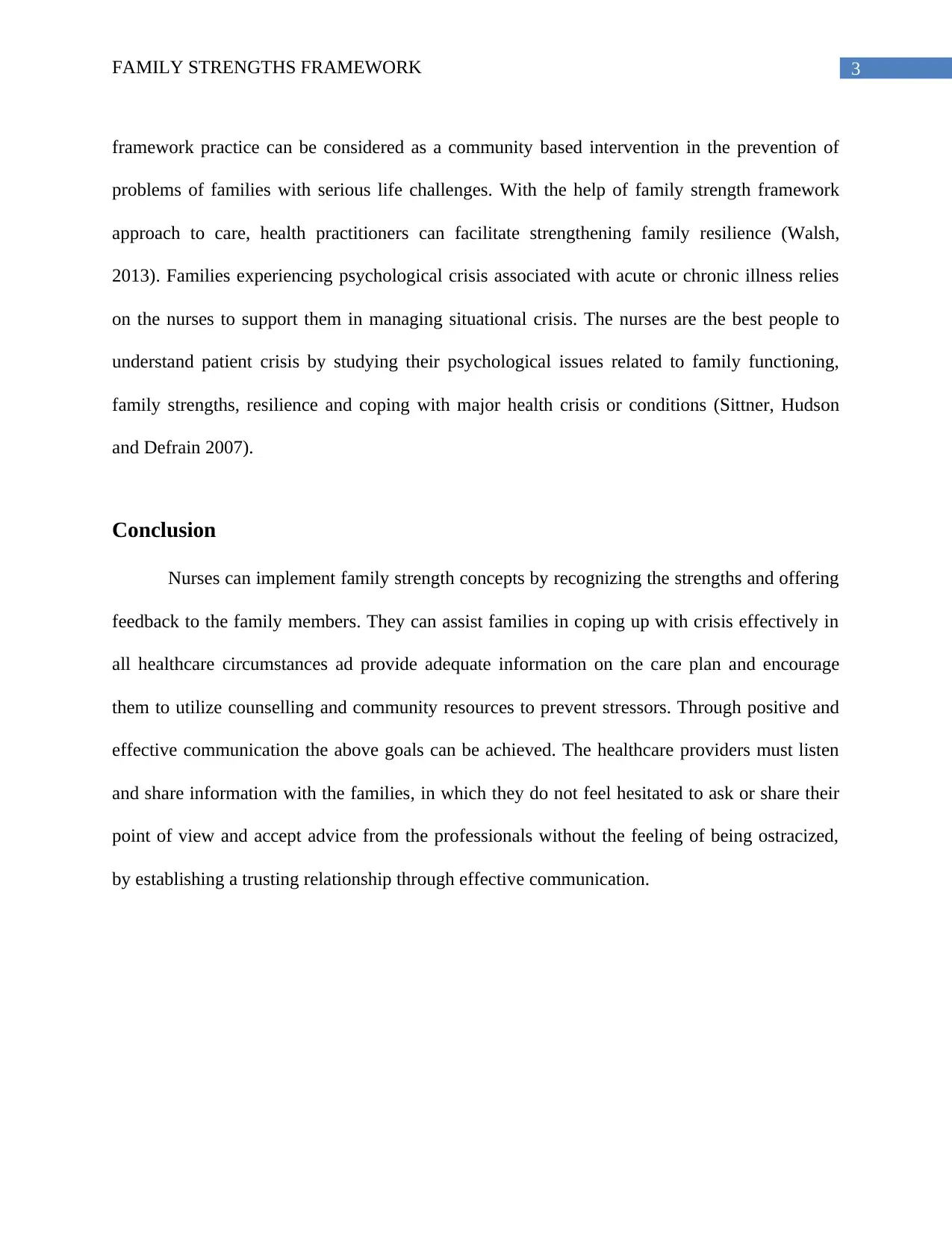
3FAMILY STRENGTHS FRAMEWORK
framework practice can be considered as a community based intervention in the prevention of
problems of families with serious life challenges. With the help of family strength framework
approach to care, health practitioners can facilitate strengthening family resilience (Walsh,
2013). Families experiencing psychological crisis associated with acute or chronic illness relies
on the nurses to support them in managing situational crisis. The nurses are the best people to
understand patient crisis by studying their psychological issues related to family functioning,
family strengths, resilience and coping with major health crisis or conditions (Sittner, Hudson
and Defrain 2007).
Conclusion
Nurses can implement family strength concepts by recognizing the strengths and offering
feedback to the family members. They can assist families in coping up with crisis effectively in
all healthcare circumstances ad provide adequate information on the care plan and encourage
them to utilize counselling and community resources to prevent stressors. Through positive and
effective communication the above goals can be achieved. The healthcare providers must listen
and share information with the families, in which they do not feel hesitated to ask or share their
point of view and accept advice from the professionals without the feeling of being ostracized,
by establishing a trusting relationship through effective communication.
framework practice can be considered as a community based intervention in the prevention of
problems of families with serious life challenges. With the help of family strength framework
approach to care, health practitioners can facilitate strengthening family resilience (Walsh,
2013). Families experiencing psychological crisis associated with acute or chronic illness relies
on the nurses to support them in managing situational crisis. The nurses are the best people to
understand patient crisis by studying their psychological issues related to family functioning,
family strengths, resilience and coping with major health crisis or conditions (Sittner, Hudson
and Defrain 2007).
Conclusion
Nurses can implement family strength concepts by recognizing the strengths and offering
feedback to the family members. They can assist families in coping up with crisis effectively in
all healthcare circumstances ad provide adequate information on the care plan and encourage
them to utilize counselling and community resources to prevent stressors. Through positive and
effective communication the above goals can be achieved. The healthcare providers must listen
and share information with the families, in which they do not feel hesitated to ask or share their
point of view and accept advice from the professionals without the feeling of being ostracized,
by establishing a trusting relationship through effective communication.
Paraphrase This Document
Need a fresh take? Get an instant paraphrase of this document with our AI Paraphraser
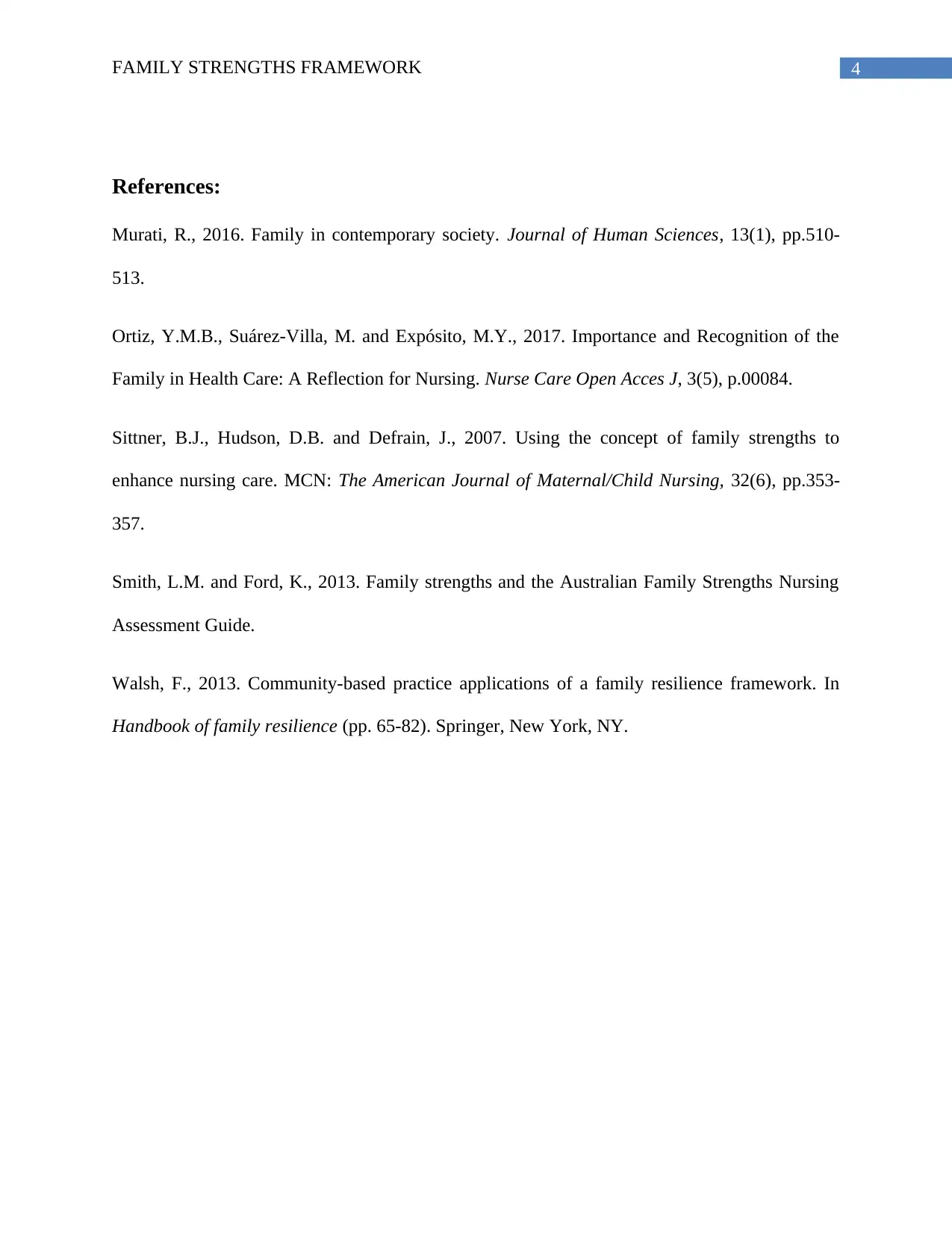
4FAMILY STRENGTHS FRAMEWORK
References:
Murati, R., 2016. Family in contemporary society. Journal of Human Sciences, 13(1), pp.510-
513.
Ortiz, Y.M.B., Suárez-Villa, M. and Expósito, M.Y., 2017. Importance and Recognition of the
Family in Health Care: A Reflection for Nursing. Nurse Care Open Acces J, 3(5), p.00084.
Sittner, B.J., Hudson, D.B. and Defrain, J., 2007. Using the concept of family strengths to
enhance nursing care. MCN: The American Journal of Maternal/Child Nursing, 32(6), pp.353-
357.
Smith, L.M. and Ford, K., 2013. Family strengths and the Australian Family Strengths Nursing
Assessment Guide.
Walsh, F., 2013. Community-based practice applications of a family resilience framework. In
Handbook of family resilience (pp. 65-82). Springer, New York, NY.
References:
Murati, R., 2016. Family in contemporary society. Journal of Human Sciences, 13(1), pp.510-
513.
Ortiz, Y.M.B., Suárez-Villa, M. and Expósito, M.Y., 2017. Importance and Recognition of the
Family in Health Care: A Reflection for Nursing. Nurse Care Open Acces J, 3(5), p.00084.
Sittner, B.J., Hudson, D.B. and Defrain, J., 2007. Using the concept of family strengths to
enhance nursing care. MCN: The American Journal of Maternal/Child Nursing, 32(6), pp.353-
357.
Smith, L.M. and Ford, K., 2013. Family strengths and the Australian Family Strengths Nursing
Assessment Guide.
Walsh, F., 2013. Community-based practice applications of a family resilience framework. In
Handbook of family resilience (pp. 65-82). Springer, New York, NY.
1 out of 5
Related Documents
Your All-in-One AI-Powered Toolkit for Academic Success.
+13062052269
info@desklib.com
Available 24*7 on WhatsApp / Email
![[object Object]](/_next/static/media/star-bottom.7253800d.svg)
Unlock your academic potential
Copyright © 2020–2026 A2Z Services. All Rights Reserved. Developed and managed by ZUCOL.





